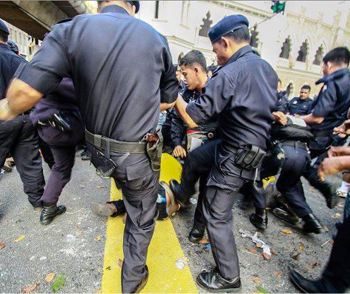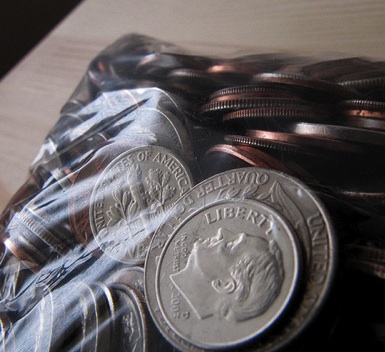In our Selected Exhortations category, we republish interesting stuff such as must-read articles and essays not originally written exclusively for the blawg, and which have come to our attention. Please feel free to email [email protected] if you would like to reproduce your writing, but first follow our Writer’s Guide here.
Foong Li Mei brings to you another edition of REFSA Rojak, a weekly take on the goings-on in Malaysia by Research for Social Advancement (REFSA).
REFSA Rojak – “trawl the newsflow, cut to the core and focus on the really pertinent. Full of flavour, lots of crunch, this is the concise snapshot to help Malaysians keep abreast of the issues of the day.”

Cops gone wild
Our men in blue lost more than their cool during the Bersih 3.0 rally in KL last weekend; their reputation and reliability were in shreds after they brutally handled the largely peaceful crowd.
Various eyewitness accounts, video footage and pictures documented the chilling aggression of the police officers when dispersing the protesters. They were seen firing rounds of tear gas and water cannons directly at the retreating public, as well as mocking, taunting and roughing up people in the crowd.
The rally, estimated to be 250,000 strong, started out as a peaceful protest for free and fair elections. Their initial plan to sit-in at Dataran Merdeka was thwarted by an 11th-hour court order barring the protesters from entering the square. Undeterred, Malaysians continued to march and gather at various routes that led to Dataran Merdeka.
The atmosphere of the yellow assembly was initially friendly. There was no intervention from the police and anti-riot Federal Reservation Unit (FRU) until the barricades at Dataran Merdeka were breached by overzealous protesters at 3pm, triggering a chaotic crackdown. Inspector-general of police, Ismail Omar, asserted that water cannons were only deployed after protesters crossed the barrier, and that the use of chemically-laced water was the ‘least hurtful way‘ to disperse the crowd’.
The breaching of the barricades does not justify the excessive use of force by the police against a crowd that was already dispersing, according to Bersih co-chairperson Ambiga Sreenevasan. The Bar Council also slammed the authorities for violating human rights, and listed several highly questionable behaviours displayed by the police force.
These allegations of police violence are being investigated under a special team formed by the authorities, while members of the public are urged to come forward with evidence.
While the police brutality deserves action and attention, it should also not dominate the post-Bersih discourse. Let us not be distracted from the fact that the election commission has been silent on the demands of Bersih 3.0. If the fraud in our electoral process is not eliminated, it could lead to a political party seizing Putrajaya illegitimately.
Don’t let the tears that flowed from our eyes and the burning pains on our skins blur our sights in the push for electoral reforms!
After Bersih 3.0, journalists join the fight for press freedom
The Bersih 3.0 rally pried opened more than one can of worms. On top of casting the searchlights on the violent behaviour of some of the police officers, the protest has uncovered the ugly truth of press freedom, or the lack thereof.
During the rally, authorities allegedly attacked and arrested journalists, besides seizing and damaging cameras and press equipment. Home Minister Datuk Seri Hishammudin defended the seizure of media equipment, claiming that it was ’the standard operating procedure of police’, a statement which the Inspector-General himself subsequently flatly contradicted.
Media blackout is even darker when it is the media companies themselves enforcing it. PKR vice president N. Surendran has accused the Home Minister of instructing chief editors of major print dailies to refrain from reporting any incident of police brutality. Subsequently, satellite TV network Astro admitted to censoring a news report by that most august of institutions, the BBC, ’to comply with the national content regulations’. Astro omitted interviews with demonstrators and the episode of policemen apparently firing at demonstrators.
Senior journalists concurred that mainstream media’s coverage of the protest was not truthful. Global Bersih, the coalition of overseas Bersih supporters, has urged Malaysian corporations to stop their dealings with the mainstream media. Businesses that advertise or enter into sponsorship with mainstream media organisations are reminded that they are ‘supporting blatant distortion and misrepresentation’ of the rally.
It is ironic that the Malaysian media is getting such bad press in the same week the rest of the world celebrates World Press Freedom Day. To mark the occasion, all major Chinese dailies printed their front pages in black and white to condemn the violence against media personnel. Some featured the yellow ribbon – the symbol of press freedom. The newscaster of NTV7 mandarin news also sported a black vest with yellow ribbon, while the deejays of radio station FM 988 donned black.
Kudos to the journalists who stood up against suppression of press freedom at the risk of, as the Chinese say, smashing their own rice bowls. Only a press that pursues what is right can speak for the voiceless, as opposed to being used as mere megaphones for political propaganda.
Minimum wage for all
On the subject of rice bowls, the minimum wage introduced for Malaysian workers is good news. Or is it? Malaysian Trades Union Congress (MTUC) and Centre for Public Policy Studies (CPPS) welcome the RM900 floor wage for Peninsular Malaysia, and RM800 for East Malaysia, but hope that the implementation of the policy will be revised from time to time. On the flipside, economists and employers warned that the minimum wage policy would lead to more unemployment, ‘black market’ labour and inflationary pressure.
In response, Pakatan Rakyat said that the minimum wage policy has to be implemented comprehensively, such as by giving ‘incentives’ to small-medium industries (SMIs) to remain competitive with improved productivity, not relying on cheap, unskilled labour.
Parting of ways
The share swap deal between Malaysia Airlines (MAS) and AirAsia has been called off, as ‘the cross-holding of shares has become a distraction to management efforts to turn around MAS’, announced Khazanah Nasional.
REFSA welcomes the parting of ways of the two airline companies. We have been deeply sceptical of the collaboration since its announcement last year, and our warnings that the rakyat would be the biggest losers have sadly proven to be true. With MAS and AirAsia back as competitors, the best interests of consumers can regain some lost altitude.
Why ‘Rojak’? Disparate flavours and textures come together in a harmonious mix to make this delicious but underrated concoction. Our Rojak weekly is much like this mix, making sense of the noise of daily newsflow and politicking.
It is also our ultimate dream that our multi-ethnic melange of communities can be made richer within the unique ‘sauce’ that is Malaysia. Let’s take pride in the ‘rojakness’ of our nation!
Click here for previous issues of REFSA Rojak.
Visit us at http://refsa.org | Like us on our Facebook page | Follow our tweets @inforefsa
(Featured image accompanying article on the main page courtesy of Chris Blakeley, source: http://bit.ly/ITGQ30)

